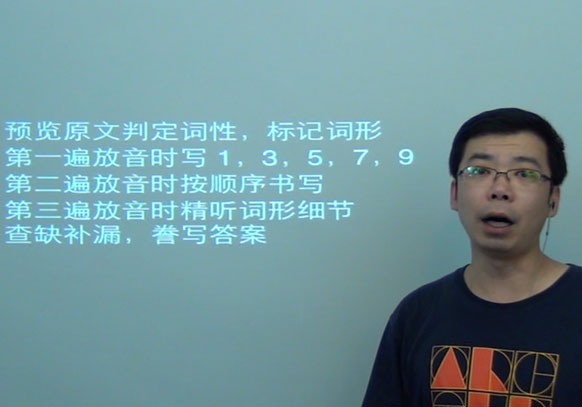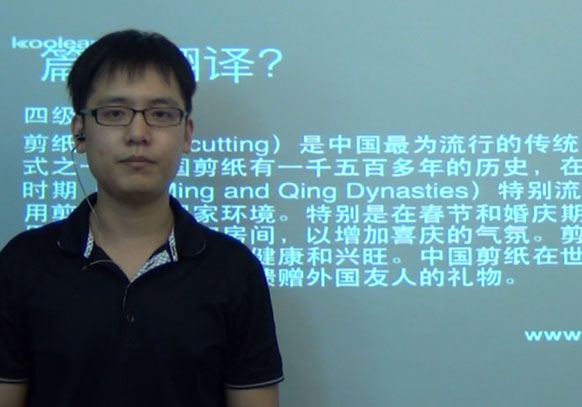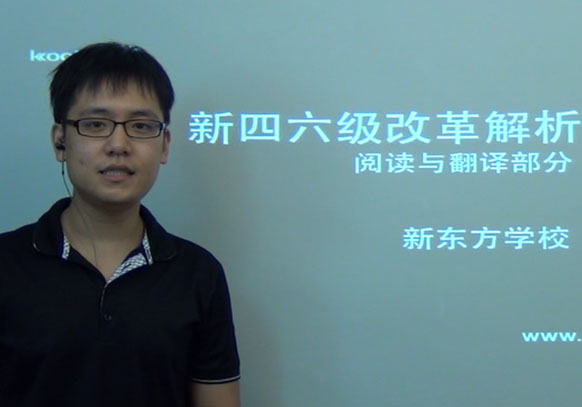
大学英语四六级考试终于迈出了改革的步伐。自2013年12月考试起,全国大学英语四、六级考试委员会将对英语四级、六级考试的试卷结构和测试题型作局部调整。调整后,英语四级和英语六级的试卷结构和测试题型相同。
- 听力原复合式听写调整为单词及词组听写
- 阅读原快速阅读理解调整为长篇阅读理解
- 翻译原单句汉译英调整为段落汉译英
- 完形填空取消完形填空
2013英语四六级改革后全新备考指南
英语四六级考试变革的来龙去脉
大学英语四级、六级考试诞生
英语四级,即CET-4,College English Test Band 4的缩写。是由国家教育部高等教育司主持的全国性教学考试;考试的主要对象是根据教育大纲修完大学英语四级的大学本科生或研究生。大学英语四、六级标准化考试自1986年末开始筹备,1987年正式实施。目的是推动大学英语教学大纲的贯彻执行,对大学生的英语能力进行客观、准确的测量,为提高我国大学英语课程的教学质服务。
满分710分,取消合格证书
2005年,教育部宣布全面改革英语四六级考试积分体制、成绩报导方式和考试内容:自2005年6月考试(试点)起,采用满分710分的计分体制,不设及格线;考试合格证书改为成绩报告单,凡考试成绩在425分以上的考生,由国家教育部高教司委托"全国大学英语四六级考试委员会"发放成绩单;在考试内容和形式上,加大听力理解部分的题量和比例,增加快速阅读理解测试,增加非选择性试题的比例。
新四级考试试运行
1月份,全国180所使用新教材的大学将试点全新四级考试,6月份开始以同等方式试行新的六级考试。
只接受在校生报名
教育部规定,从2007年1月起,大学英语四六级考试只接受在校生报名。1月份全面实施改革后的四级考试,6月份全面实施改革后的六级考试。第一部分听力理解占35%,第二部分阅读理解占35%,第三部分综合测试占15%,第四部分写作占15%。
真正实行"多题多卷"
自2012年下半年起,教育部考试中心对英语四六级考试全面实施"多题多卷"的考试形式,跟以往采用一套试题,仅通过题目顺序变化实现"多卷"不同,此次改革推行同一考场内使用多套试卷进行考试,且每一套试卷的题目内容都不一样。
取消完形 翻译加重 时间加长
来自全国大学英语四六级考试网站的消息,今年12月起,四六级英语考试题型将发生变化:1.听写变成全部考查单词短语;2.快速阅读变成段落信息匹配题;3.翻译扩充至150~200字的整段中译英;4.不再考查完形填空。
英语四六级改革对比图
原复合式听写调整为单词及词组听写,短文长度及难度不变。要求考生在听懂短文的基础上,用所听到的原文填写空缺的单词或词组,共10题。短文播放三遍。
英语四六级改革后听力样题
-
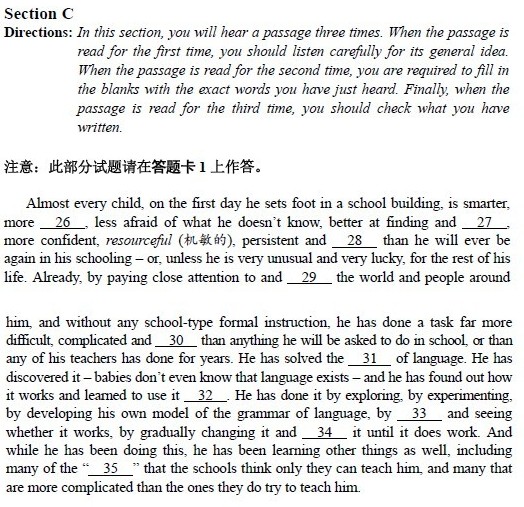
-
答案
Section C
26. curious
27. figuring things out
28. independent
29. interacting with
30. abstract
31. mystery
32. appropriately
33. trying it out
34. refining
35. concepts
英语四六级改革之前 2012年12月英语听力真题
-
Section C
Americans today have different eating habits than they had in the past. There is a wide (36) ______ of food available. They have a broader (37) ______ of nutrition (营养), so they buy more fresh fruit and (38) _______ than ever before. At the same time, Americans (39)______ increasing quantities of sweets and sodas. Statistics show that the way people live (40) ______ the way they eat. American lifestyles have changed. There are now growing numbers of people who live alone, (41) ______ parents and children, and double-income families. These changing lifestyles are (42) ______ for the increasing number of people who must (43) ______ meals or sometimes simply go without them. Many Americans have less time than ever before to spend preparing food. (44) ______________Moreover, Americans eat out nearly four times a week on average. It is easy to study the amounts and kinds of food that people consume. (45) _____________This information not only tells us what people are eating, but also tells us about the changes in attitudes and tastes. (46) __ Instead, chicken, turkey and fish have become more popular. Sales of these foods have greatly increased in recent years.
-
答案
Section C
36. potentially
37. experienced
38. gasp
39. dizzy
40. fatigue
41. constant
42. adverse
43. precautions
44. Your body needs to get used to a high altitude before you climb to a even higher one.
45. When you reach your top height, do like activities rather than sleep too much.
46. Don't risk injury or death because of
新东方在线赵建昆老师点评
从样卷看,10个答案中,共短语占2~3个。单词拼写难度两张试卷难度依然比较模糊,例如四级可以考到appropriately这样的难词,而六级也可以考出romantic这种四级在1998年就考过的词汇。几乎所有人都认为,取消句子听写会使得听写难度减弱,恰恰相反,这只会使考生的偶然得分率提高,而考生长期忽视听写和拼写的事实会导致必然失分率的增加。因为在过去的句子听写中,整句2%的分值可以至少保证考生写出句子中部分较为简单的单词继而得分,而新试卷中,一词(或一个短语)占1%的设计,会让得分和失分出现在转瞬之间。
你不妨做个测试,先看看以下几个中文词组,看能写出几个?然后看下拉看答案。
易受伤害的;聪明的;抽象的;把事情搞清楚;
答案:
Vulnerable intelligent abstract figuring things out
策略:请确认,在每次做完听力题目之后,题目选项和对应原文(答案区域)中全部单词短语保证拼写成功。不用急,稍后,在考前约一个月,建昆老师的微信将开始播发每日听写训练。
新东方在线推荐课程
| 课程名称 | 课时 | 原价 | 优惠价 | 试听 | 购买 |
|---|---|---|---|---|---|
| 【协议】 大学英语四级425零基础VIP全程班--新题型vip | 165 | 2,400 | 1,500 | 免费试听 | |
| 大学英语四级听力精讲特训班 | 18 | 240 | 200 | 免费试听 | |
| 大学英语四级听力词汇必备vip | 10 | 80 | 60 | 免费试听 |
原快速阅读理解调整为长篇阅读理解,篇章长度和难度不变。篇章后附有10个句子,每句一题。每句所含的信息出自篇章的某一段落,要求考生找出与每句所含信息相匹配的段落。有的段落可能对应两题,有的段落可能不对应任何一题。这个题型会让很多人不由自主地想到考研英语新题型和雅思阅读,虽各不同,但有通点。
2013英语四级改革后长篇阅读样题
-
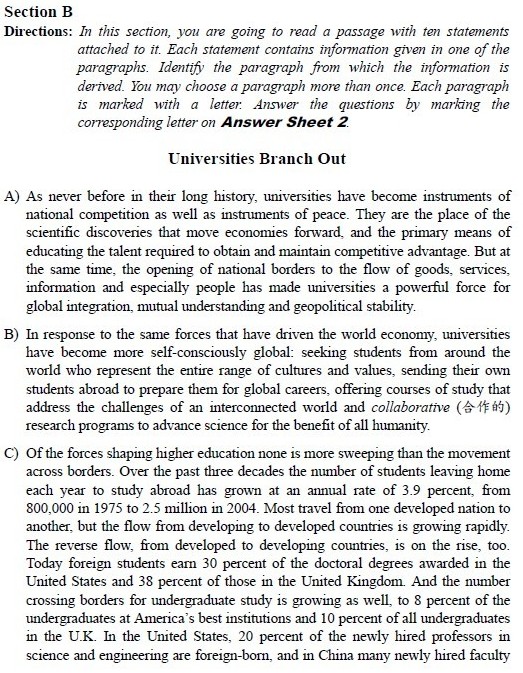
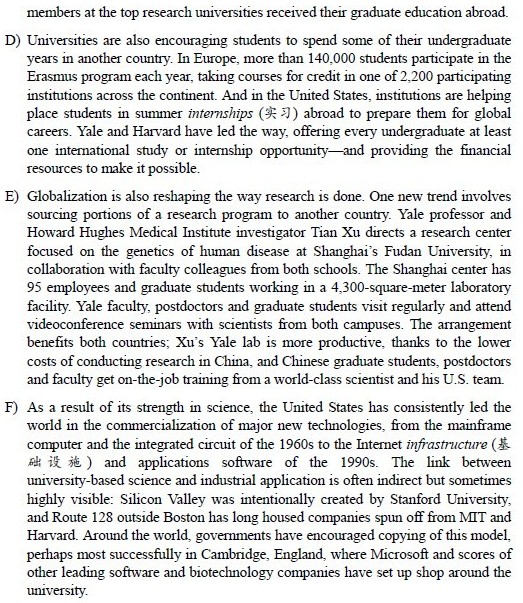
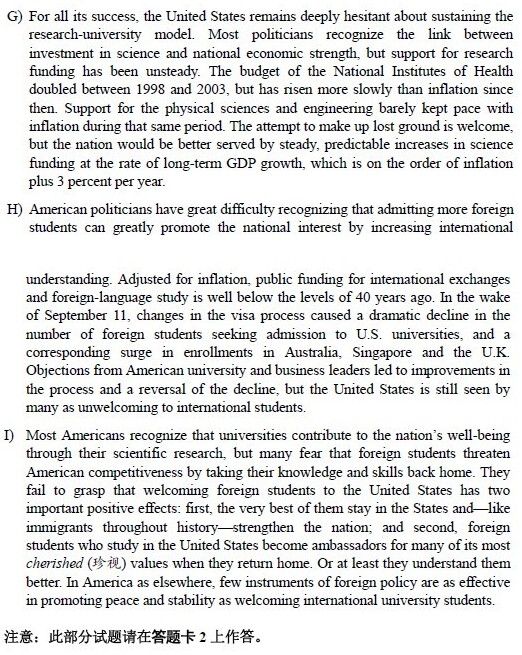
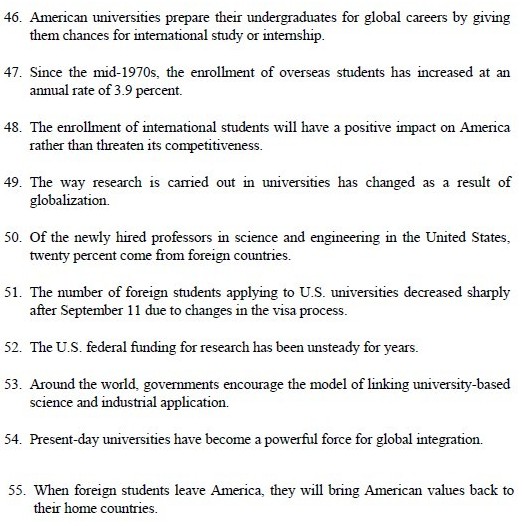
-
答案
Section C
46. D
47. C
48. I
49. E
50. C
51. H
52. G
53. F
54. A
55. I
英语四级改革之前2012年12月英语阅读真题
-
Part II Reading Comprehension (Skimming and Scanning) (15 minutes)
Directions: In this part, you will have 15 minutes to go over the passage quickly and answer the questions on Answer Sheet 1. For questions 1-7, choose the best answer from the four choices marked A), B), C) and D). For questions 8-10, complete the sentences with the information given in the passage.
The Magician
The revolution that Steve Jobs led is only just beginning
When it came to putting on a show, nobody else in the computer industry, or any other industry for that matter, could match Steve Jobs. His product launches, at which he would stand alone on a black stage and produce as if by magic an "incredible" new electronic gadget (小器具)in front of an amazed crowd, were the performances of a master showman. All computers do is fetch and work with numbers, he once explained, but do it fast enough and "the results appear to be magic". Mr Jobs, who died recently aged 56, spent his life packaging that magic into elegantly designed, easy-to-use products.
The reaction to his death, with people leaving candles and flowers outside Apple stores and politicians singing praises on the internet, is proof that Mr Jobs had become something much more significant than just a clever money-maker. He stood out in three ways-as a technologist, as a corporate (公司的)leader and as somebody who was able to make people love what had previously been impersonal, functional gadgets. Strangely, it is this last quality that may have the deepest effect on the way people live. The era of personal technology is in many ways just beginning.
As a technologist, Mr Jobs was different because he was not an engineer-and that was his great strength. Instead he was keenly interested in product design and aesthetics (美学), and in making advanced technology simple to use. He repeatedly took an existing but half-formed idea-the mouse-driven computer, the digital music player, the smartphone, the tablet computer(平板电脑)-and showed the rest of the industry how to do it properly. Rival firms competed with each other to follow where he led. In the process he brought about great changes in computing, music, telecoms and the news business that were painful for existing firms but welcomed by millions of consumers.
Within the wider business world, a man who liked to see himself as a hippy (嬉皮士), permanently in revolt against big companies, ended up being hailed by many of those corporate giants as one of the greatest chief executives of his time. That was partly due to his talents: showmanship, strategic vision, an astonishing attention to detail and a dictatorial management style which many bosses must have envied. But most of all it was the extraordinary trajectory (轨迹)of his life. His fall from grace in the 1980s, followed by his return to Apple in 1996 after a period in the wilderness, is an inspiration to any businessperson whose career has taken a turn for the worse. The way in which Mr Jobs revived the failing company he had co-founded and turned it into the world's biggest tech firm (bigger even than Bill Gates's Microsoft, the company that had outsmarted Apple so dramatically in the 1980s), sounds like something from a Hollywood movie.
But what was perhaps most astonishing about Mr Jobs was the absolute loyalty he managed to inspire in customers. Many Apple users feel themselves to be part of a community, with Mr Jobs as its leader. And there was indeed a personal link. Apple's products were designed to accord with the boss's tastes and to meet his extremely high standards. Every iPhone or MacBook has his fingerprints all over it. His great achievement was to combine an emotional spark with computer technology, and make the resulting product feel personal. And that is what put Mr Jobs on the right side of history, as technological innovation (创新)has moved into consumer electronics over the past decade.
As our special report in this issue (printed before Mr Jobs's death) explains, innovation used to spill over from military and corporate laboratories to the consumer market, but lately this process has gone into reverse. Many people's homes now have more powerful, and more flexible, devices than their offices do; consumer gadgets and online services are smarter and easier to use than most companies' systems. Familiar consumer products are being adopted by businesses, government and the armed forces. Companies are employing in-house versions of Facebook and creating their own "app stores" to deliver software to employees. Doctors use tablet computers for their work in hospitals. Meanwhile, the number of consumers hungry for such gadgets continues to swell. Apple's products are now being snapped up in Delhi and Dalian just as in Dublin and Dallas.
Mr Jobs had a reputation as a control freak (怪人), and his critics complained that the products and systems he designed were closed and inflexible, in the name of greater ease of use. Yet he also empowered millions of people by giving them access to cutting-edge technology. His insistence on putting users first, and focusing on elegance and simplicity, has become deep-rooted in his own company, and is spreading to rival firms too. It is no longer just at Apple that designers ask: "What would Steve Jobs do?"
The gap between Apple and other tech firms is now likely to narrow. This week's announcement of a new iPhone by a management team led by Tim Cook, who replaced Mr Jobs as chief executive in August, was generally regarded as competent but uninspiring. Without Mr Jobs to shower his star dust on the event, it felt like just another product launch from just another technology firm. At the recent unveiling of a tablet computer by Jeff Bezos of Amazon, whose company is doing the best job of following Apple's lead in combining hardware, software, content and services in an easy-to-use bundle, there were several attacks at Apple. But by doing his best to imitate Mr Jobs, Mr Bezos also flattered (抬举)him. With Mr Jobs gone, Apple is just one of many technology firms trying to arouse his uncontrollable spirit in new products.
Mr Jobs was said by an engineer in the early years of Apple to emit a "reality distortion (扭曲)field", such were his powers of persuasion. But in the end he created a reality of his own, channeling the magic of computing into products that reshaped entire industries. The man who said in his youth that he wanted to "put a ding in the universe" did just that.
注意:此部分试题请在答题卡1上作答。
1. We learn from the first paragraph that nobody could match Steve Jobs in .
A) intelligence C) magic power
B) showmanship D) persuasion skills
2. What did Steve Jobs do that most deeply affected people's way of life?
A) He invented lots of functional gadgets.
B) He kept improving computer technology.
C) He started the era of personal technology.
D) He established a new style of leadership.
3. Where did Mr Jobs's great strength lie?
A) His profound insight about consumers' needs in general.
B) His keen interest in designing elegant and user-friendly gadgets.
C) His firm determination to win in the competition against his rivals.
D) His rich knowledge as a computer scientist and electronic engineer.
4. Many corporate giants saw Steve Jobs as .
A) one of the greatest chief executives of his time
B) a dictator in the contemporary business world
C) an unbeatable rival in the computer industry
D) the most admirable hippy in today's world
5. For those who have suffered failures in business, Steve Jobs's life experience serves as .
A) a symbol C) an ideal
B) a standard D) an inspiration
6. What was the most astonishing part of Mr Jobs's success?
A) He turned a failing company into a profitable business.
B) He set up personal links with many of his customers.
C) He commanded absolute loyalty from Apple users.
D) He left his fingerprints all over Apple products.
7. What is mentioned in this issue's special report about innovation nowadays?
A) It benefits civilians more than the military.
B) New products are first used in the military.
C) Many new ideas first appear on the internet.
D) It originates in the consumer market.
8. In spite of the user-friendliness of Apple products, critics complained that they were .
9. Amazon, by having hardware, software, content and services in an easy-to-use bundle, did the best job in following Apple's lead.
10. By channelling the magic of computing into products, Steve Jobs had succeeded in .
-
参考答案
1.B
2.C
3.B
4.A
5.D
6.C
7.C
8.closed and inflexible
9.combined
10.putting a diny in the universe
新东方在线赵建昆老师点评
这种设置,在雅思阅读中被称之为"段落信息匹配题",经典之处在于迷惑力强。请关注这句话:有的段落可能对应两题,有的段落可能不对应任何一题。按样卷的设置:
四级本题共计9段,对应10题,这意味着必有一段对应两题;
六级本题共计15段,对应10题,这意味着必有5题是纯干扰段。
阅读环节时间依然很紧张,选词+段落+精读,合计40分钟。目测新题目大家只能做10分钟。时间如此只短,题量如此之大(六级10分钟读15段内容+判断),相应训练和技巧必须到位。
策略:这中阅读题目属于快速阅读和信息匹配的合体。在词汇基础基本保证的情况下,一些相关阅读技巧必须纯熟。比如,特殊信号词汇在段落和题目中的对应,例如数字、大写、特殊符号;段落首句作为重点信息处理;特别关注段落衔接句等等。当然,大量训练不可少。
新东方在线推荐课程
| 课程名称 | 课时 | 原价 | 优惠价 | 试听 | 购买 |
|---|---|---|---|---|---|
| 【协议】 大学英语四级425零基础VIP全程班--新题型vip | 165 | 2,400 | 1,500 | 免费试听 | |
| 大学英语四级阅读精讲特训班vip | 44 | 240 | 200 | 免费试听 | |
| 大学英语四级阅读特训营vip | 30 | 240 | 180 | 免费试听 |
原单句汉译英调整为段落汉译英。翻译内容涉及中国的历史、文化、经济、社会发展等。四级长度为140-160个汉字;六级长度为180-200个汉字。
2013年英语四级改革之后翻译样题
-
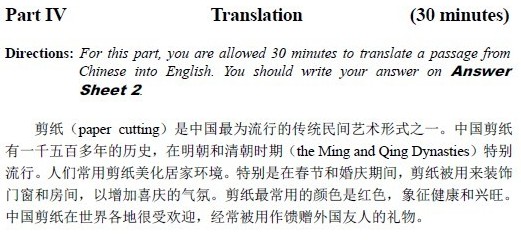
-
参考答案
Paper cutting is one of China's most popular translational folk arts. Chinese paper cutting has a history of more than 1.500 years .It was widespread particularly during the Ming and Qing Dynasties . People often beautify their homes with paper cuttings . During the Spring Festival an wedding celebrations ,in particular, paper cuttings are used to decorate doors , windows and rooms in order to enhance the joyous atmosphere . The color most frequently used in paper cutting is red, which symbolizes health and prosperity . Chinese paper cutting is very popular around the world and it is often given as a present to foreign friends .
英语四级改革之前2012年12月英语翻译真题
-
PartVI Translation (5minutes)
注意:此部分题请在答题卡2上作答,只需写出疑问部分。
87. I finally got the job I dreamed about. Never before in my life___________ (我感到如此激动)!
88. Yesterday Jane left the meeting early. Otherwise, she____________________ (可能会说一些后来会懊悔的话).
89. With the noise going on outside the classroom, I had great difficulty________ (集中注意力复习功课).
90.This is the first time I_______________________(听到他们用法语交流).
91. All the information you need to apply for your visa is___________________ (可以免费获取).
-
答案
Section C
1.我感动如此激动had I felt so excited
2. 可能会说一些后来会后悔的话could had said something she would regret later.
3. 集中注意力复习功课 in focusing reviewing lessons
4. 听到他们用法语交流hear they communicating in French
5.可以免费获取 accessing it free
新东方在线赵建昆老师点评
这是这次改革最难的一种题目。可以确定,如果不降低评分标准,这个项目将成为全国考生丢分的黑洞。
我们来看看样卷中的原文节选:
四级:人们常用剪纸美化居家环境。特别是在春节和婚庆期间,剪纸被用来装饰门窗和房间,以增加喜庆的气氛。
六级:各地欢度春节的习俗和传统有很大差异,但通常每个家庭都会在除夕夜团聚,一起吃年夜饭。为驱厄运、迎好运,家家户户都会进行大扫除。
从题目看,翻译难度确实和考研翻译及专八翻译不是一个量级。但是对基本从来不联系翻译的考生来说,词汇和短语其实只是第一道障碍,例如:"喜庆的气氛""进行大扫除",更多的障碍在于:遣词造句。以"增加喜庆的气氛"为例,"增加"一词,考生基本反应都是increase, 而标准答案是:To enhance the joyous atmosphere.
策略:
必须开始有意识的积累和背诵一些和中国节日、历史事件、经济和社会发展相关的词汇。大家可以关注以反映中国社会为主的一些英文杂志和报纸,例如中国日报及其网站。这份报纸的大部分内容确实超越了考生的实力,但是一些涉及到日常社会生活的词语,却是大家可以学习的。大家每天看看网站中头条新闻,配合中文新闻的背景,就可以学到很多表达。推荐一个中国日报网站下面的一个小栏目:language tips,有大量简单实用的双语文章。同时,考生需要购进一些难度不大的翻译书籍,注意中英文的一些切换规则。
新东方在线推荐课程
| 课程名称 | 课时 | 原价 | 优惠价 | 试听 | 购买 |
|---|---|---|---|---|---|
| 【协议】 大学英语四级425零基础VIP全程班--新题型vip | 165 | 2,400 | 1,500 | 免费试听 | |
| 大学英语四级翻译抢分班vip | 8 | 80 | 60 | 免费试听 | |
| 大学英语语法特训课程vip | 11 | 150 | 100 | 免费试听 |
